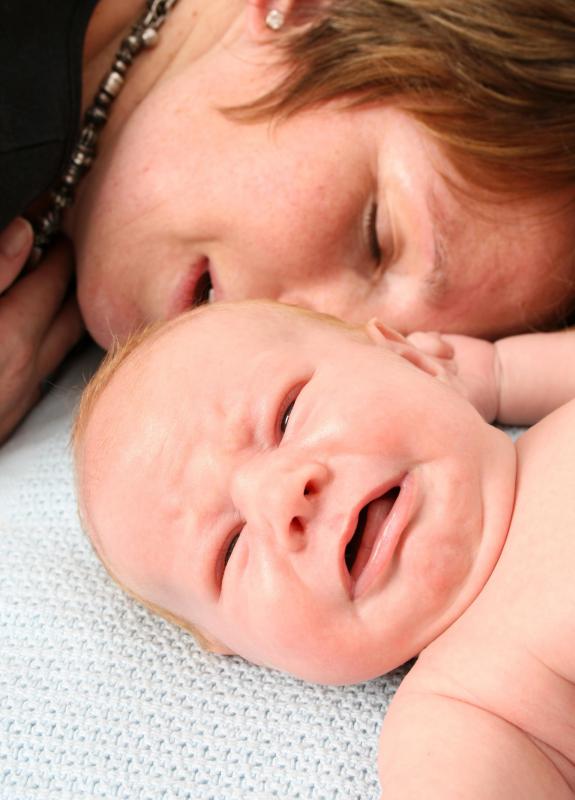At TheHealthBoard, we're committed to delivering accurate, trustworthy information. Our expert-authored content is rigorously fact-checked and sourced from credible authorities. Discover how we uphold the highest standards in providing you with reliable knowledge.
What is Emotional Lability?
The ability to control expression of emotions exists in most people. On occasion a person gets a fit of the giggles or finds himself crying over something that isn’t very sad; worse yet, anger can fly out of control if people do not understand how to keep it check. While these experiences are common, regular occurrence of emotional displays that are disproportionate to what is occurring, also called emotional lability, is not that usual. Being labile — unsteady or subject to quick change — emotionally tends to suggest the presence of a number of conditions that may involve the brain.
The symptoms of emotional lability might vary among individuals and in frequency of occurrence. Fits of laughter or crying jags are two examples. Some people do evidence this most with explosive tempers, and there can be instances where people will experience all three emotionally excessive expressions at varied times. When these expressions occur, it’s often daunting for the people undergoing them because many people know that their emotional response is in excess to the circumstances. It can even get embarrassing for some individuals or be a condition that makes them withdraw socially.
Causes of emotional lability are diverse. People may experience this condition after suffering head trauma or after having a stroke. It can be a symptom of degenerative brain disorders like multiple sclerosis or amyotrophic lateral sclerosis.

Those who have Alzheimer’s disease may develop emotional lability. It’s also sometimes seen in common learning disabilities, such as attention deficit hyperactivity disorder (ADHD) or the symptoms might be suggestive of postpartum depression or psychosis. Other causes can exist.
Symptoms of emotional lability tend to be most likely to occur at certain times. Sudden excessive displays of emotion tend to be especially common when people are tired, under pressure, in unfamiliar situations, or feeling stressed. Worry about sudden emotional expression may actually prompt it, making matters more challenging. Part of treatment for this disorder is to help people find coping strategies and ways to be in social situations that give them back some control. For instance, asking someone to ignore a behavior like nervous laughter might be a way of bringing that laughter under control more quickly.

There are other treatments for quickly changing emotions. These could include medications that help slightly dull emotional response, particularly certain forms of antidepressants. Additional treatment for emotional lability might be had in the form of work in therapy, especially cognitive behavioral therapy. Relaxation techniques can be useful too in bringing the person out of the labile state, too.

Not everyone is able to receive psychological, relaxation based, or coping strategy treatment. If severe brain deterioration has occurred, emotional lability may simply be tolerated, provided it doesn’t harm the person suffering it. This might be the case with those with advanced stages of dementia, severe retardation or irreparable and massive brain damage.
AS FEATURED ON:
AS FEATURED ON:















Discussion Comments
I have always been extremely emotional, ever since childhood. My teacher in second grade called me a "crybaby".
As I grew up, the problem never went away. I have always gotten upset easily and sometimes I still have bouts of intense crying that shake my entire body, with tears and snot pouring down my face. I briefly lose awareness of what's going on, and the tears make it nearly impossible to see anything. These episodes pass on their own after several minutes.
When I was younger, I also used to go into fits of laughter over some really stupid thing. I would laugh so hard that I had to struggle sometimes to catch my breath. These episodes are rarer in my stressful and depressing adult life and tend to happen when my mind is not bogged down with worries.
More common in my life currently are the crying episodes as well as sudden angry outbursts, which are made worse by stress, anxiety, overstimulation and fatigue. I am continually learning new coping methods to minimize my stress thereby minimizing my emotional outbursts. I learn to avoid people, things or situations which I know to upset me, especially at crucial moments when maintaining composure is imperative.
I have a traumatic brain injury, and I react to a stressful situation by cursing, and I quite often curse if surprised or shocked. I'm always conscious, aware and often afraid when not in my comfort zone.
I haven't had any brain trauma or a stroke or anything but for some reason I've cried during odd circumstances and it's uncontrollable. It's very embarrassing and normally happens when I forget to take my antidepressant. One time I was talking to my ta about a mark and I was struggling to hold back tears. I think it's why I don't want to be in relationships.
I had a crying problem when I was a child. It was quite embarrassing, and the teachers did actually think it was some sort of emotional trauma I was covering up. I was also diagnosed with ADHD and had a growth problem that required me to take growth hormone injections. I was able to sleep anywhere, any time and would often have strange and disturbing dreams.
Two years ago, I was diagnosed with Reactive Hypoglycaemia (the opposite of diabetes) and it turns out all the symptoms previously pointing to other problems were related and had been all along. The emotional lability; the confusion and attention problems; growth retardation; degradation of vision; even the shaking hands, all pointed to sharp drops in blood sugar levels occurring over and over again, going untreated for years.
After suffering a TBI, I had terrible crying jags. I wasn't sad, just fatigued, overwhelmed, or frustrated. I could not control it and it was embarrassing. My doctor started me on a new drug that has made a huge difference. I do not work for the company or anything but I encourage anyone suffering from this problem to look into Neudexta. It helped me a lot.
I suffered a severe traumatic brain injury in 1997 and had damage to my frontal lobe. Also, I had a father that committed suicide when I was younger. What should I do? It makes me feel like a freak, because you cannot tell that anything is wrong with me physically. Exercise helps the most, but I have to really force myself to do it sometimes. I need help!
Many medications that medicate brain chemicals can produce any one of a number of desired effects, from cholesterol control to treatment of depression, and also list emotional liability as a possible or likely side effect.
This source of emotional liability goes unmentioned here, as does mention of the apparent authenticity that emotional liability from these sources often possesses. The difficulty of separating these feelings from actual feelings mediates against the effectiveness of self-control of these false emotions through recognizing their inappropriate nature.
I am so glad that you included Alzheimer's as a cause of emotional lability in this article.
It is so hard to not take that kind of thing personally, particularly when you are a caregiver for someone with Alzheimer's, and it really helps to see the emotional and psychological side of this condition get the recognition it deserves.
@EarlyForest -- You are totally right, PMS can cause emotional lability, particularly in those women with severe symptoms.
Women who become particularly emotionally charged during their periods often find the emotional disturbances to be even worse than their physical symptoms, and at times just as debilitating.
Emotional lability is also associated with the most serious PMDD, where women experience huge mood swings during their period, along with hopelessness, insomnia, and emotional depression.
This can be a truly serious condition, and those with excessive emotional lability during their periods should consider whether it could be something more serious, like PMDD, going on.
Is PMS a cause of emotional lability? I know that I am terrible about emotional crying during my period, and wondered if this could be the same thing.
Can anybody enlighten me?
Post your comments